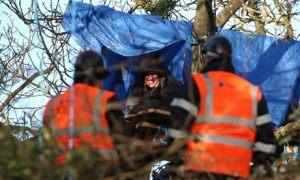Industry found to have files on more than 200 activists, provided by security services or police – prompting calls for official inquiry
by Matthew Taylor / Guardian UK

A road protester near Crowhurst, Sussex: over half of the UK’s top construction firms are thought to have been involved in keeping a blacklist of environmental activists. Photograph: Gareth Fuller/PA
Hundreds of environmental activists were on a secret “blacklist” used by construction firms in an attempt to disrupt high-profile protests against road building and other developments.
Files on more than 200 campaigners were held alongside a list of more than 3,000 construction workers who had raised legitimate health and safety concerns or belonged to a trade union.
Last week MPs said the list had deprived thousands of people of work and driven some families to destitution. Evidence of the growing scale of the operation carried out by the Consulting Association has led to renewed calls for an official inquiry.
Chuka Umunna, the shadow business secretary, told the Guardian: “This is greatly concerning and we still don’t know what the full scale of the blacklisting scandal was. In light of this new evidence, it is crucial that a full investigation of blacklisting commences.”
During a debate on blacklisting in parliament last week, Umunna said more than half of the top 20 construction firms in the UK were involved.
The Information Commissioner’s Office (ICO), which raided the Consulting Association in 2009, said some of the details on the list appeared to have been provided by the security services or police.
Umunna said: “Very serious allegations have been raised, including by a serving ICO official who is himself a former police officer, that information contained on blacklist files came from police and security services. This only reinforces the need for a full investigation into blacklisting so we can get to the full truth of what went on.”
Details of the environmental blacklist emerged during evidence from Ian Kerr, the Consulting Association chief officer, to a committee of MPs (pdf) that construction firms wanted information on the protesters after being “badly hit” by their campaigns.
“In the mid-90s the industry was literally taken unaware by the people who came along and built tree houses, cut the hydraulic lines on the equipment and put sand in the tanks, because at the time it was quite easy to win a contract and put a route through an area,” Kerr told the Scottish affairs committee in November. “There wasn’t a lot of attention paid to what got knocked down and what site of special scientific interest was filled in along the way.”
He said the construction industry had held a forum to discuss the issue, which led the Consulting Association to amass files on more than 200 protesters.
It is unclear exactly what details were held on environmental protestors. Information on a separate blacklist of more than 3,000 construction workers is said to have forced thousands of workers into long-term unemployment and is alleged to have come from a variety of sources including press cuttings, the construction firms, police or security officials and, in some cases, other union members.
Last week MPs called the blacklisting a “secret, insidious, shameful practice” and warned it might still be going on.
John McDonnell, the Labour MP for Hayes and Harlington, said: “This goes on today, just because you’re a trade unionist, you stand up for health and safety or simply because you want to ensure justice and fairness at work. I want the inquiry to examine all those things in the past, but I want an inquiry that opens up the doors and invites people to come forward with evidence.”
Len McCluskey, the general secretary of Unite, said it was “national scandal”. “Construction companies have been allowed to get away with a conspiracy to spy on thousands of ordinary construction workers and destroy their careers.
“Lives have been ruined and families have been torn apart just because workers have raised safety concerns in Britain’s most dangerous industry, or just because they exercised their human rights to belong to a trade union.”

